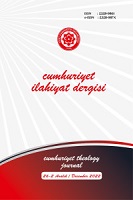Ümeyye b. Ebü’s-Salt’ın Hayatı ve Tarih Konulu Bazı Şiirleri Üzerine Bir İnceleme
Umayya b. Abū’l-Ṣalt's Life and A Review on Some of His Poems on History
Author(s): Mücahit YÜKSELSubject(s): Cultural history, History of Islam, Theory of Literature, History of Religion, Sociology of Literature
Published by: Cumhuriyet Üniversitesi İlahyat Fakültesi
Keywords: Islamic History; Jāhilī Period; Umayya b. Abū l-Ṣalt; Poem; History;
Summary/Abstract: The History of Islam, which makes use of the Qur’ān, ḥadīth and many auxiliary sources, did not ignore the different elements that would shed light on the events of the periods it studied. At this point, the poem draws attention as an important source containing much data on the history of the prophets, sīrat, genealogy, and socio-cultural life. Umayya b. Abū l-Ṣalt (d. 8/630) is an important poet who has witnessed both the Jāhilī Period and the Islamic period, and has poems containing the abovementioned themes. There are different opinions about his belief status. In this context, there are discourses that consider him as Christian, Jewish, Hanīf, and monotheist. However, although it is a fact that Umayya was a ḥanīf in Jāhilī Period, his oppositional attitude with the advent of Islam is another fact. In the historical sources, there are many poems which are attributed to Umayya and contain different subjects. When these poems are examined, especially the poems that deal with the belief of oneness and the hereafter; it is seen that the creation of the world, the lives of past tribes and prophets, sīrat, some cultural elements, elegy, praise, and lineage were also handled by him. However, when the content and style of Umayya's poems, especially about the lives of the prophets, are examined, there are doubts as to whether these poems belong to him. For example, his poem about the story of Adam is as follows: “And they all prostrated to Adam by His permission / Only the damned, the sinner, and the expelled refused it /The Lord of the servants said to Iblis: / Get out of there fired, cursed and vilified.” When compared with the verses of the Qur'ān, it is seen that the information presented by Umayya about the story of Adam does not contradict with the information in the Qur'ān. “It is We Who created you and gave you shape; then We bade the angels prostrate to Adam, and they prostrate; not so Iblis; He refused to be of those who prostrate.” “(Allāh) said: "Get thee down from this: it is not for thee to be arrogant here: get out, for thou art of the meanest (of creatures).” In Umayya's poems, the story of Noah is discussed in with more details: “In the evening the flood was sent and the water overflowed. / There was no container to hold it. / He swims like an arrow seeking revenge. / And crossing the sea. / Everything began to speak with a miracle. / And the crow responded to the rooster's trust with treason. / After seven days the dove was sent / That; was unafraid of dangers and showed courage. / It was said, let's search the earth / Can you find a dry place with a water source in its furthest part? / Flew away fast. / Then he brought a cluster of black sticky mud on it.” In the poems of Umayya, in which he talks about the stories of the Prophet, many words and stories that the Arabs do not know are used. The story of the crow, rooster, and pigeon in this poem is one such example. It is said that Umayya was influenced by the old books and the words of the People of the Book in the story about the crow, the rooster, and the pigeon. Because, although there are differences in the details, it is seen that this issue is mentioned in the Torāh. Cevād Ali, who touches on this issue, states that “if it is true that these poems belong to him” and says that the available data is evidence that Umayya met with the People of the Book and knew the content of their books. While evaluating this issue, Behcet Abdulagafur referred to the 49th verse of the Surah Hūd and he emphasized two possibilities, pointing out that the story was not known to people before, including the Prophet Muḥammad: Umayya recited them from the Qur'ān and sang his poems according to the Qur'ān. However, this is a low probabilirty. Or, this poem does not belong to him and was later made up for him. He saw the second option more strongly and said that the poem did not resemble Umayya's style as a reason. The Prophet avoided a wholesale approach and evaluated Umayya's poems according to their content. Because while approving some of his poems, he also banned his poems that he sang as a lament for the polytheists killed in Badr, which did not comply with the Islamic understanding. The Prophet said about him: “His poetry became a Muslim, but his heart denied it.” Thus, while revealing that the content of Umayya's poems is generally suitable for Islam, he also stated that he was not a Muslim. At the same time, he banned his poems that were against Islam
Journal: Cumhuriyet İlahiyat Dergisi
- Issue Year: 26/2022
- Issue No: 2
- Page Range: 539-558
- Page Count: 21
- Language: Turkish

